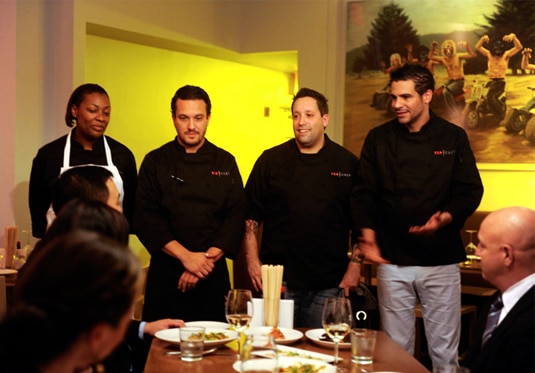The Sincerest Form of Flattery
Eli Kirshtein explains why this weke's challenge was so special for the chefs.

Chefs love chefs by nature. Most chefs are at least somewhat food anthropologists, collecting cookbooks, menus from past meals, and other food related swag. Chefs also idolize chefs. In formidable years of a chef's career, they will make pilgrimages to work for other chefs, or at least dream about it. Amongst themselves they talk about them, who is opening what, who was the original chef at a given restaurant, or even who used to work for who. Chefs often times will have conversations about the lineage of a dish, the originator of it, those who might have copied or been inspired by it. Chefs like to geek out about chefs. So then one of the hardest components of the show is unquestionably cooking for said idols. All of the chefs have combated this before in their respective previous season, it does get somewhat less stressful, but not completely stress-free.
This is a step above and beyond this. The chefs aren’t just cooking for these culinary paragons; they are replicating their styles. A chef is trying to get into another chef's head, and to be frankly honest, these are four of the most desirable culinary heads to get into. They want to recreate the feel, aesthetic, emotion, and even the magic of their creations, without overtly copying any specific technique, concept, or flavor profile. They also must tread so very carefully so as not to be insulting to the chefs, being overly stereotypical of their style, not to commercialize and sterilize their food philosophy. They say that copying is the fondest form of flattery, but this is much more about making a definition of them out of requirement and not elation. The chefs aren’t just being asked to embrace a challenge taking them well out of their own culinary comfort zone, but asking them to embody another chef all together.
On top of having to attempt to respectfully, tactfully, and eloquently recreate all of these hallowed chefs' styles, having Kate Krader as a judge is just daunting. Being the restaurant editor for Food & Wine magazine, she has an immense amount of clout in her daily grind. Her responsibilities include helping spot culinary trends, get a view of new hot restaurants, and most importantly help scout new culinary talent from around the country. She has an instrumental hand in the process for the selection of the very much-coveted Food & Wine Best New Chef awards each year. She is a judge you want to leave a lasting impact on with out a question.
It can also be a trap to get lost in the moment. The chefs can quickly become overwhelmed or intimidated not just by cooking for great chefs but also by being in legendary kitchens. Walking into the kitchen of White, Chang, Dufresne, or Burke is a dream come true for many chefs. They are in kitchens that have been awarded the proverbial Michelin stars, been the engine room for many a legendary meal, and even been fodder for many a conversation about food. A chef must use the experience to be inspired and not overwhelmed. Since kitchens are truly living breathing things, they should draw on them as a muse to create and replicate the tone it sets for their usual culinary team. A really exciting challenge.
Follow me on Twitter at www.twitter.com/elikirshtein



